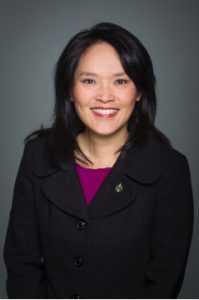As new regulator of immigration consultants opens, questions raised
As new regulator of immigration consultants opens, questions raised

Jenny Kwan, M.P. Vancouver East, NDP, Caucus Chair; Critic – Housing; Immigration, Refugees and Citizenship. (Photo supplied)
November 29, 2021
By Veronica Silva Cusi
LJI Reporter
The Philippine Reporter
After years of planning and consultations, a new regulatory body for immigration consultants opened last week (Nov 23) the third attempt at regulating thousands of consultants that help immigrants, international students, and relatives of Canadian citizens, move to Canada permanently.
But the opening of the new College is not without questions as Canada continues to rely on migration to fuel its economy.
The new body, called the College of Immigration and Citizenship Consultants (CICC), takes over from the Immigration Consultants of Canada Regulatory Council (ICCRC) established in 2010 and took over from the Canadian Society of Immigration Consultants (CSIC) established in 2003.
CICC’s powers and function emanate from the College of Immigration and Citizenship Consultants Act of 2019 and cover all paid immigration and citizenship consultants from across Canada.
Unlike CICC, “neither the CSIC nor the ICCRC was established by statute” as noted by the draft “Code of Professional Conduct” for CICC licensees.
In a press statement, Immigration, Refugee and Citizenship Canada (IRCC) said “new College is a key part of the government’s efforts to fight fraud in Canada’s immigration system.”
A 2017 report of the House of Commons Standing Committee on Citizenship and Immigration mentioned unscrupulous practices of representatives taking advantage of newcomers to Canada. These practices have “dire consequences for applicants, including delays with immigration applications, financial hardship and losing legal immigration status in Canada.”
Jenny Kwan, M.P., Vancouver East, B.C. and NDP caucus chair, and critic for Housing; Immigration, Refugees and Citizenship, was vice-chair of the committee.
In an interview with The Philippine Reporter, Kwan said she has “some concerns” with the opening of the College.
“The process that Parliament went through at … the Immigration Committee … was to call for a process that is going to be taken outside of an industry-led regulatory system,” said Kwan. “Unfortunately, the Liberal government did not listen to those recommendations and came in with this industry-led College … so we have to see how it’s going to run.”
The first among the 21 recommendations of the 2017 report is to “create, by statute, an independent public-interest body empowered to regulate and govern the profession of immigration consultants …. This would be a government regulated body.”

Michael Huynh MSc, BCL, LLB, Director, Professional Conduct, College of Immigration and Citizenship
Consultants.
(Photo supplied)
Michael Huynh, CICC director for Professional Conduct, told TPR in a separate interview that the new College will have a balance between five soon-to-be-named individuals appointed by the Minister of Immigration and four individuals who would be elected by the membership, and “that will be the transitional board for the foreseeable future.”
Kwan also questioned the code of professional conduct that is still in draft.
“I don’t know how the government can open the College while the code of conduct is not finalized. How will consultants know what they are supposed to abide by by way of their ethical conduct if that code of conduct is not made available?” she said.
Huynh confirmed to TPR that the code is still in draft. Yet, he expressed optimism that with the College’s new powers and through its complaints and disciplinary process, the interests of clients of immigration and citizenship consultants are protected.
“Our body is committed to the highest standards in education, professional practice, and ethics and we uphold the ideals needed to build trust in Canada’s immigration system,” said Huynh.
“We have a robust complaints and discipline process that we are now you know building up as well as improving because of these additional powers that were gaining. … We’re working with the licensees to educate them on these new requirements.”
Kwan also expressed concern on the conflict of interest where consultants can offer both immigration or citizenship consulting services and recruitment services to a client, particularly temporary foreign workers.
The draft code said this is a conflict of interest but go on to list conditions to avoid this conflict.
“In the draft code, they have a whole bunch of provisions to talk about how to avoid … and even the requirement of having to disclose that you are recruiting for the employer. … But from my perspective, you should actually avoid every situation of potential conflict, and this is clearly a situation where conflict potential conflict of interest would occur and I just think that that’s the wrong way to go,” said Kwan.
Huynh said that with the new powers of the College emanating from the CICC Act, the regulator now has more clout not available before.
“We have a rigorous complaints and discipline process … and what we’re building … is stronger powers to investigate complaints, compel testimony and participation which we didn’t have before.”
He said CICC is also building a team to address what was previously a big problem in Canada and abroad — these individuals who were practicing without authorization or without a license.
“In addition to the licensing standards, we now have more robust enforcement powers … that allows us to become a regulator with real clout and influence, and I think that’s going to be a significant change in the regulation of this industry,” he added.
The College oversees the Regulated Canadian Immigration Consultants (RCICs) and Regulated International Student Immigration Advisors (RISIAs). CICC said existing RCICs and RISIAs will immediately become licensees of the new College, but further training will be required if consultants want to represent clients at the Immigration and Refugee Board of Canada.
———————————-
Veronica Silva Cusi is Local Journalism Initiative reporter.



Comments (0)